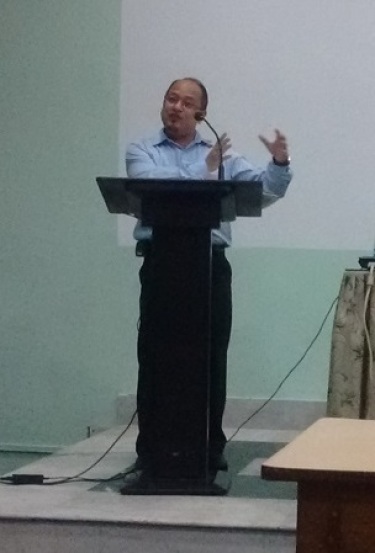
Ravi Zachariah's International Ministry (RZIM) held a seminar on the relevance of faith in an age of science at Scottish Church College, Kolkata, attended by over 200 students.
The guest speaker, Balajied Lang Nongrum, took on the subject armed with knowledge of both the worlds, using the wisdom of Bible to explain the place science has in our lives, its scope and limitations in understanding the reality and the truth of this universe.
The discourse was a breather in a university environment dominated by an intellectual culture that fails to go beyond cold science in explaining the phenomena around us.
Balajied begun the session, dealing with the meaning of truth, and its pursuit. He asked the students why they wanted to study in college, to which some replied, "for education," "for socialization," "for degree."
The speaker from RZIM, who is pursuing a Masters degree in Religion and Science from Biola University, reminded the students that the main purpose they were attending college was to seek the truth. The truth is the reality of the universe, the reality of everything around them, and the reality of 'self'. But what is learnt in college does not necessarily prepare them to understand or cope with many realities of their own life, such as knowing the right person to marry, and knowing who is the cause of this universe.
Balajied gave an example from a dialogue between two famous people of 18th century – mathematician Laplace and Napoleon, who walked up to the scientist and asked him where God fit into his mathematical equation on universe. Without batting an eyelash, Laplace famously replied, "Sir, I have no need of that hypothesis." His statement was misunderstood by many, which so troubled Laplace, that later in his life he corrected the misinterpretation of his comment, saying that if he were asked this question, "who is the cause of the universe," he would have replied, "Perhaps, God."
What Laplace meant was that God is not a rule built into the action of forces, but he is the cause behind all.
In the hour-long symposium, the speaker sought to clear the confusion between mechanism and agency.
Balajied went on to explain that even science acknowledges the law of causality. When there is an effect, there has to be a cause. The universe, the big bang, is an effect. Now if the universe is an effect, then it raises the question – "what is the cause?"
Afterwards, he spoke about the branch of science that deals with design of the universe at the level of macrocosm and microcosm.
He said that at the macrocosm level, the universe is maintained by 4 basic forces – weak and strong nuclear forces, gravity, and electromagnetic force, which maintain the distance between planets. If any one of these, he noted, would have gone a little beyond or fallen short, even in the score of decimals, then the universe would have collapsed or no star could have been formed in the first place, with no possibility of life.
The microcosmic life is not less mystifying for those who study them. Balajied pointed out that our cells function like little, but, incomprehensibly complicated hard drives, run by about 3.5 million information bits stored in our dna. He then cited Francis Collins, one of the scientists behind the Human Genome Project, who wrote in his book, The Language of God, that there is an intelligent input that is needed to feed into the information bits. That is, for an intelligent output, an intelligent input is needed. This basic observation points to the existence of a Designer, Balajied observed.
It is often said that evolution goes against the Biblical prescriptions, but again, he noted that science tells us "how", and Bible tells us "why"? Also, Genesis, the first chapter of Bible, was written in an era with absolutely no knowledge of scientific principles, yet the first chapter is amazingly scientific, chronicling the pattern of emergence of broad forms of life, just the way described in evolutionary eras. The "days" of creation as mentioned in Bible, may not refer to strictly "24-hour day", but point to eons, subject to different forms of interpretation of the words used for "days" in Hebrew, the original language in which the Bible was written.
However, there are certain stumbling blocks in the theory of evolution that have not been accounted for yet.
For example, the theory of evolution suggests that life originated from a tiny organism, through eons of time evolving into this complexity. The basic problem with this approach, said Balajied, is that this design is akin to an inverted tree growing out of nothing, with one branch being led from another branch. However, the actual fossil findings suggest evolution of life with a design akin to an upright tree, with many branches simultaneously coming out from a common trunk.
The seminar concluded with an enlightening interactive session between Balajied and students, who had a lot of questions about the universe and existence. One girl asked him the way we can be sure of the absoluteness of our philosophy or direction of quest, to which he replied that the way to be sure is by confirming it with reality, as truth always corresponds with reality. In the same vein, he said God does not contradict science, nor science can ever dismiss God. What needs to be made clear is that mechanism is distinct from agency, and an understanding of both of them is required to comprehend the truth.




